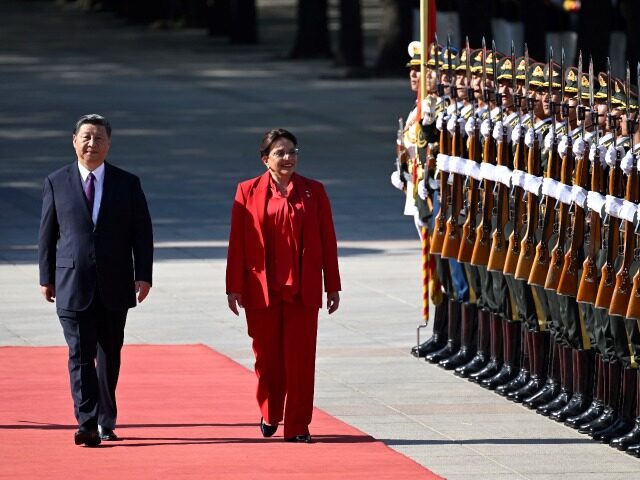Honduras Foreign Minister Enrique Reina told China’s state-run newspaper, the Global Times, Sunday that his country is joining China’s predatory Belt and Road Initiative (BRI) after Honduras broke its historic diplomatic ties with Taiwan nearly three months ago.
Reina gave his statements during the inauguration event for Honduras’s new embassy in Beijing, which opened one week after the inauguration of its counterpart in Tegucigalpa.
The Honduran foreign minister is part of the delegation led by the nation’s radical leftist President Xiomara Castro, who arrived in China on Friday — marking Castro’s first visit to the Asian nation after she instructed her government to establish diplomatic relations with China in March, ending the Central American nation’s 80-year relationship with Taiwan. The Chinese Communist Party demands all nations seeking diplomatic ties with the country deny the reality of Taiwan’s existence as a sovereign, democratic state.
Castro met with Chinese dictator Xi Jinping in Beijing on Monday, signing 17 bilateral agreements on Belt and Road construction projects, agriculture, technology, and education.
“China will unswervingly develop friendship with Honduras and is determined to support the economic and social development of the country,” Xi said.
Castro stated that developing a good relationship with China could allow Honduras to “gain better and more opportunities of development.” The Honduran president added that her administration is willing to actively promote the relations between China and the Community of Latin American and Caribbean States (CELAC) regional bloc.
The Belt and Road Initiative is a Chinese program in which the Chinese government offers countries predatory “debt trap” loans for infrastructure projects, often under unfavorable terms. The loans are used to pay Chinese companies to work on the agreed projects. Given that the loans are debt traps in nature, the countries eventually find themselves unable to pay them back, allowing China to seize the projects or exert pressure and influence on countries.
Xi said on Monday that China is willing to begin talks toward signing a free trade agreement with Honduras “as soon as possible.” Foreign Minister Reina confirmed to the Global Times on Sunday that a representative of China’s Commerce Ministry will travel to the Central American nation in early July to promote the eventual signing of a free trade agreement.
Honduras and El Salvador both signed a joint free trade agreement with Taiwan in 2007 that went into effect in 2008. Like Honduras, El Salvador broke off relations with Taiwan in 2018 and is now seeking to sign a free trade agreement with China.
The Honduran top diplomat asserted that it is “very important” for Honduras to recognize the Chinese Communist Party’s “One-China Principle,” which states that there is only one China in the world, and, as such, Taiwan is not an independent nation, but rather, a province of China. Taiwan’s official name is the Republic of China.
Reina explained that his nation’s decision to adhere to the One-China principle is a “sovereign” decision and that Honduras does not see it as an issue that could affect its ability to maintain good relations with the United States while strengthening its future relations with China.
Shortly after Honduras announced the establishment of relations with China, Taiwan’s Foreign Minister Joseph Wu denounced Honduras’s demand for billions of dollars in economic assistance in exchange for keeping its ties to Taiwan. The requested amount, according to Wu, totaled $2.45 billion in aid and included the construction of a hospital and a dam to write off Honduras’s debt.
“It felt like what they wanted was money, not a hospital,” Wu said, adding that Castro — who took office in 2022 — and her government had “always had illusions” about China, and China’s “luring” of Honduras had never stopped.
On Saturday, Castro also formally requested the inclusion of Honduras in the BRICS bloc’s new development bank following her official visit to the bank’s headquarters in Shanghai. BRICS is the acronym for the economic alliance between Brazil, Russia, India, China, and South Africa. The BRICS bank is led by former Brazilian President Dilma Rousseff, the protegé of current Brazilian radical leftist President Luiz Inácio Lula da Silva, who recently traveled to China in April to “relaunch” his nation’s relations with the Chinese communist party.
Reina also noted that Honduras hopes to be a member of the BRICS bloc.
“I think there’s a new opportunity for financial issues that Honduras will be seen as a new opportunity for projects in development, in either the social or economic way that will improve the people’s livelihoods,” Reina said.

COMMENTS
Please let us know if you're having issues with commenting.